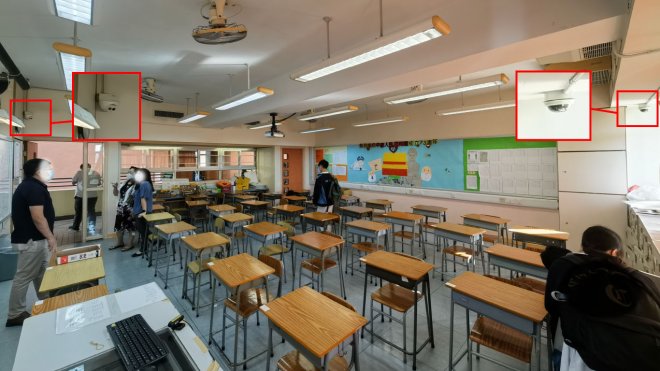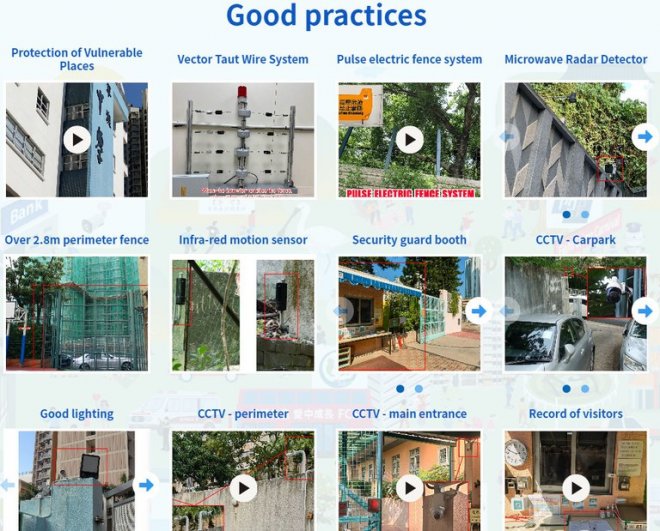
Hong Kong police are calling for surveillance cameras to be installed in school and university classrooms and public spaces, prompting fears among teachers and students.
The proposal, on a new security website called Safe City Hong Kong, is among several “good practices” for schools, including installing perimeter fencing of at least 2.8 meters (9 feet) in height, security guard booths and infrared motion sensors around their perimeter, as well as electric fencing and taut-wire tripping systems.
The proposals are the latest examples of the Communist Party’s encroachment on civil liberties in Hong Kong under a new security law.
In mainland China, there is already a widespread culture of political informants in schools and universities, and there are concerns that this could soon spread to Hong Kong, where a hotline taking reports of national security law breaches received 400,000 calls last year.
Facial recognition and other high-tech access systems were also on the list of upgrades, along with increased vetting of security guards, the website showed.
While more commonly seen measures like decent lighting and closed-circuit TV in parking lots and the recording of visitor details are also listed, teachers who spoke to RFA Cantonese on condition of anonymity expressed concerns that the measures were out of proportion to the threats faced by schools in Hong Kong.
While teachers said schools do face problems like theft and bullying, high-tech measures like voice and facial recognition technology didn"t seem proportionate, reasonable or transparent.
"They will be able to monitor you while teaching at all times, which means you will need to be careful at all times," one teacher said, adding that there are privacy concerns, giving that students need somewhere private to change their clothes.
Monitoring instruction, engagement
The move comes after calls by pro-Beijing politicians in 2021 for surveillance cameras to be installed in classrooms to monitor the content of classes and interactions between teachers and students.
Liberal Party member Tommy Cheung told a legislative committee meeting in that year that “through installing CCTV cameras… we can objectively monitor the teacher’s classroom environment."
Then Education Secretary Kevin Yeung responded by saying that schools wishing to install closed-circuit TV and other monitoring equipment would need to comply with government guidelines and privacy requirements, and communicate with parents and other stakeholders in advance.
 Some of the recommendations posted on the Safe City Hong Kong website. Credit: RFA screenshot
Some of the recommendations posted on the Safe City Hong Kong website. Credit: RFA screenshot
Yeung also told the Legislative Council that the government had no plans to install surveillance cameras to monitor teachers, amid widespread mistrust of and opposition to the move.
Around the same time, schools were being forced to deliver a new and more patriotic social education program to replace Liberal Studies, which the ruling Communist Party blamed for the participation of large numbers of young people in recent waves of pro-democracy protests dating back to 2009.
From debate to memorization
Teachers told Radio Free Asia that where students were once asked to debate topics from more than one perspective, they are now being told to memorize swathes of government-approved content by rote.
Neither the Hong Kong Police, the Education Bureau nor the Office of the Privacy Commissioner had responded to requests for comment by the time of writing.
The imposition of the national security law on the city from June 30, 2020, ushered in an ever-widening crackdown on all forms of dissent and political opposition.
Dozens of former lawmakers are standing trial for "subversion" for taking part in a democratic primary, and the closure of the pro-democracy teachers" union after it was described as "a malignant tumor" by pro-Beijing media.
Meanwhile, hundreds of young people jailed for taking part in the mostly peaceful 2019 protest movement have been sent for "re-education" and military-style bootcamp training.
The Chinese Communist Party revealed plans in February 2021 to expand the work of its Young Pioneers children"s organization to Hong Kong, Macau, and the democratic island of Taiwan, as well as further "cultivating" the nation"s children at home.
The Central Committee has said the work of the Young Pioneers is a "strategic" and "fundamental" part of its rule.
Translated by Luisetta Mudie. Edited by Malcolm Foster.